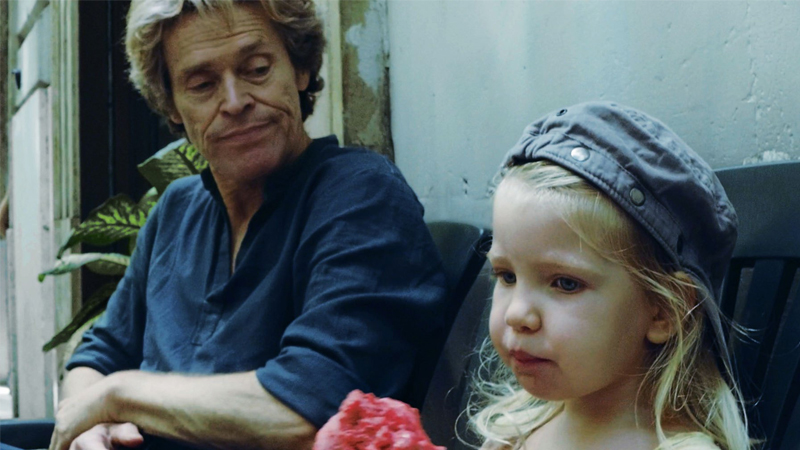 Any resemblance to actual persons, living or dead, is anything but coincidental in Abel Ferrara’s Tommaso; short of giving the protagonist the same name as the Bad Lieutenant director, the connection between Willem Dafoe’s wiry, wound-up cineaste in front of the camera and the living legend behind it couldn’t be more explicit.
Any resemblance to actual persons, living or dead, is anything but coincidental in Abel Ferrara’s Tommaso; short of giving the protagonist the same name as the Bad Lieutenant director, the connection between Willem Dafoe’s wiry, wound-up cineaste in front of the camera and the living legend behind it couldn’t be more explicit.
The title character is a New Yorker now living in Rome, much like Ferrara himself, who’s gingerly feeling his way around his adopted city and culture. During the day, Tommaso takes Italian lessons, teaches acting classes and preps a film project that bears a passing resemblance to Ferrara’s snowbound existential drama Siberia. At night, he goes to Alcoholic Anonymous meetings and talks of the agony and ecstasy regarding seven years of sobriety – roughly the same amount of time that the notoriously partying-friendly filmmaker has been clean. Then he goes home to flat he shares with Nikki, the Russian mother of his child. She’s played by Cristina Chiriac, Abel’s real-life partner. And the adorable moppet, Deedee? That’s Anna Ferrara, their daughter.
So many blurred lines, so much personal sound and fury being shot, cut, printed. It’s tempting to view Ferrara’s self-proclaimed “portrait of an artist as a not-so-young man” as a thinly veiled autobiography, his current living situation refashioned as a day-in-the-life character study. Write what you know, and what the director knows in his newly domesticated, debauchery-free life are walks in the park, prayer beads, and waiting for the local market to get fresh pineapple and beans in.
Slowly, however, we start to see cracks forming. Tommaso is experiencing a bit of a creative block. The child has put a strain on the relationship. One day, while sitting at the playground with Deedee, he sees his beloved with a hot young, hippie-ish guy. Or maybe this frustrated man only “thinks” he sees this infidelity happen, as he’s starting to become an unreliable narrator. His fuse keeps getting shorter. Hallucinations, usually involving long shots of naked, nubile woman – family life hasn’t cured Ferrara of this particular cinematic quirk – keep reoccurring. You’re not sure what real or imagined after a while. Tommaso tells his Al-Anon group about trying to do an American version of La Dolce Vita in Miami. Ferrara, however, is putting his spin on a much more internal Fellini movie.
 The fifth of their six collaborations together, Tommaso finds Dafoe and his director leaning into the funky, push-pull groove they’ve established since 1998’s New Rose Hotel. More than Harvey Keitel, more than Christopher Walken, more than the late Zoe Lund, the Oscar-nominated actor has become Ferrara’s muse, and Dafoe’s performance channels enough of the filmmaker’s personality to suggest he’s channeling Abel without “doing” Abel. Ferrara, for his part, long ago figured out that the actor works best when he’s out on a tightrope without a net. Using a mixture of heavily scripted scenes and what Dafoe has called goal-driven “scenarios” that rely on improvisation, they lead Tommaso through mundane daily routines, wild detours and a mix that may just be figments of the stifled artist’s imagination. Like a lot of Abel’s recent narrative and nonfiction output, it’s loose to the point of nearly falling apart. That’s also what makes their work together so exciting. It’s that same thrill you’d get watching John Cassavetes direct Ben Gazzara. And what the director is trying to do here requires someone who gets the good, the bad and the ugly of the man who created it.
The fifth of their six collaborations together, Tommaso finds Dafoe and his director leaning into the funky, push-pull groove they’ve established since 1998’s New Rose Hotel. More than Harvey Keitel, more than Christopher Walken, more than the late Zoe Lund, the Oscar-nominated actor has become Ferrara’s muse, and Dafoe’s performance channels enough of the filmmaker’s personality to suggest he’s channeling Abel without “doing” Abel. Ferrara, for his part, long ago figured out that the actor works best when he’s out on a tightrope without a net. Using a mixture of heavily scripted scenes and what Dafoe has called goal-driven “scenarios” that rely on improvisation, they lead Tommaso through mundane daily routines, wild detours and a mix that may just be figments of the stifled artist’s imagination. Like a lot of Abel’s recent narrative and nonfiction output, it’s loose to the point of nearly falling apart. That’s also what makes their work together so exciting. It’s that same thrill you’d get watching John Cassavetes direct Ben Gazzara. And what the director is trying to do here requires someone who gets the good, the bad and the ugly of the man who created it.
Because in the end, these two men have indeed made a personal film – just not the late-act roman à clef you think you’re getting. Ferrara may have found a sense of inner peace after years of self-induced chaos, but he still has demons to be kept at bay, and Tommaso eventually reveals its true form. This is not not an autobiography, it’s an exorcism. Whether Tommaso’s dual climaxes are detailing the product of a fevered mind or actual violence, you get the sense that some genuine walk through the valley of the shadow of death has transpired. All this, plus a shout-out to one of Dafoe’s best-known roles that works on a number of levels. If this is Ferrara hashing through his issues, may his troubled soul never be totally purged.